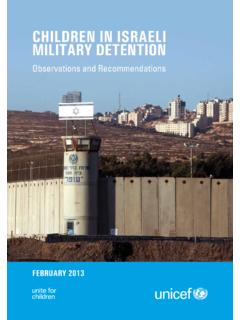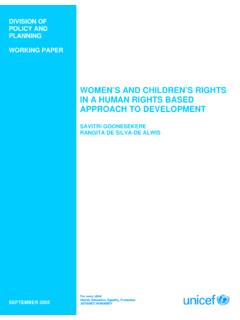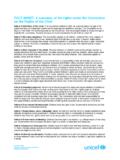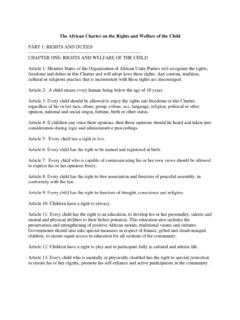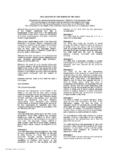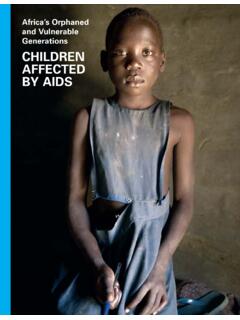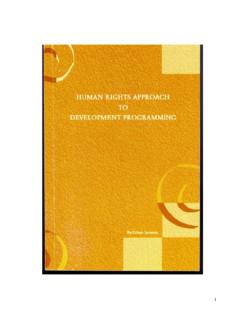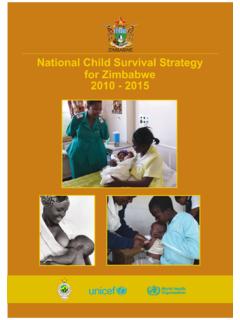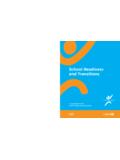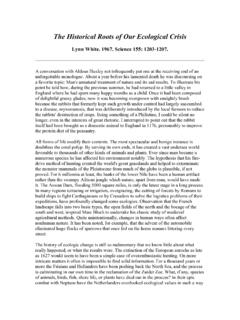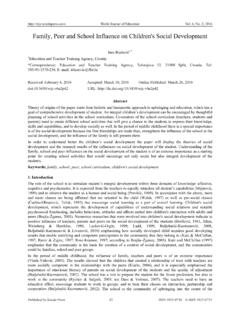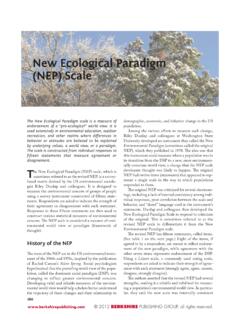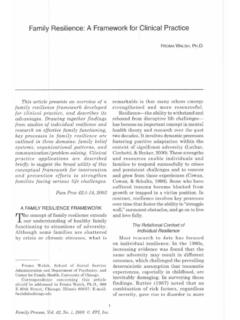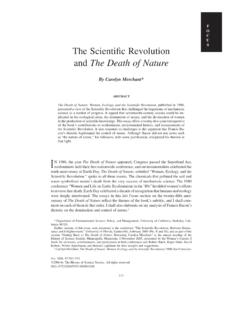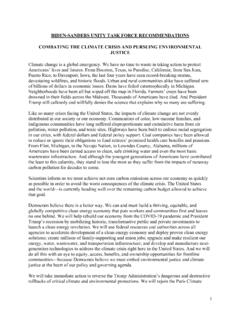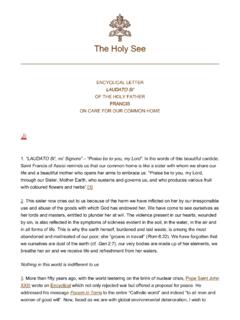Transcription of The Climate Crisis - UNICEF
1 The Climate Crisis Climate Change Impacts, Trends and Vulnerabilities of Children in Sub Saharan Africa The Climate Crisis Climate Change Impacts, Trends and Vulnerabilities of Children in Sub Saharan Africa WASH Section, UNICEF ESARO. 30 October 2020. Authors Dr Samuel Godfrey (PhD, MSc CEng, BA(Hons), CEnv, CWem). Regional Advisor, Water Supply, Sanitation, Hygiene (WASH) / Regional Focal Lead Climate , Environment and Energy United Nations Children Fund ( UNICEF ) East and Southern Africa Regional Office (ESARO). Farai Angela Tunhuma (BEng, MSc, MBA). WASH Specialist Climate and Urbanization UNICEF ESARO. Suggested citation: Godfrey, S. and Tunhuma, , The Climate Crisis : Climate Change Impacts, Trends and Vulnerabilities of Children in Sub Sahara Africa, United Nations Children's Fund Eastern and Southern Africa Regional Office, Nairobi, September 2020. Contents iii v vi viii Executive x 1.
2 1. Greenhouse gas emissions and Climate 4. Definition of key 7. 2. Climate change scenarios and projections for 10. Sub-regional impact of Climate 14. West 14. Southern 15. Eastern 16. The Eastern African 17. Climate change and urbanization in 17. Climate change, migration and displacement in 22. Climate hazards, risks, impacts and vulnerabilities in 23. The cost of inaction to Climate change in Sub-Saharan 26. 3. Climate change policy and financing in 29. Nationally determined 29. Country-level 29. National Adaptation Programmes of 27. Status of National Adaptation 32. Financing mechanisms for managing Climate 33. 4. Rationale for 34. Rationale for UNICEF Climate change 34. Climate change and 38. Climate change and 39. 5. UNICEF in 41. UNICEF Advising and supporting government 41. Low-carbon approaches when working with 42. iii Developing a Climate -informed country 43. Case study 1: Developing a Climate -informed country programme in 44.
3 Reducing the carbon footprint of 47. Case study 2: Reducing the carbon footprint of UNICEF operations through prepositioning critical supplies in South 47. Climate change, innovation and the circular 49. Case Study 3: Innovation and circular economy approaches in C te d' 49. Climate change and 51. Case Study 4: UNICEF WFP Joint Resilience Programming for food security in 52. Climate change and 53. Case Study 5: Climate -resilient WASH in 55. Case Study 6: Building resilience in the Sahel through Multi sectoral 57. Climate change, social inclusion and 60. Case Study 7: Social protection to strengthen resilience of mothers and children in 61. Climate change and 62. Case study 8: Building resilience through inclusion of DRR in the education system in 63. Climate change and 65. Case study 9: Impact of the 2015 2016 El Ni o on child health in southern 66. Climate change, youth engagement and 67.
4 Case study 10: UNICEF Scout Movement partnership for youth engagement on Climate change in Eastern and Southern 68. 6. 71. Annex 1: Examples of gender dimensions, adaptive strategies and possible 77. iv Contributors The authors would like to sincerely thank several contributors, without whom this report would not have been possible. Overall advice, guidance and critical inputs were provided by: Carmen Aiazzone, Partnerships Specialist, UNICEF ESARO; Lars Bernd, Programme Specialist, UNICEF WCARO; Sophie Chavanel; Chief of Communications UNICEF C te d'Ivoire; Kudakwashe Chimanya, Nutrition Specialist, UNICEF ESARO; Nicola Dell'. Arciprete Partnerships Specialist, UNICEF ESARO; Christina de Bruin, Senior Advisor, UNICEF Brussels HQ; James Elder, Regional Chief of Communication, UNICEF ESARO;. Natalie Fol, Regional Adviser Communication for Development, UNICEF ESARO; Gabriele Fontana, Regional Adviser, Health, UNICEF ESARO; Moustapha Harouna, Chief WASH, UNICEF Mauritania; Dawda Jawara, WASH Specialist, UNICEF WCARO; Kitka Goyol, Chief of WASH, UNICEF Ethiopia; Christine Haufner, Consultant, UNICEF Brussels HQ.
5 Jean Benoit Manhes, UNICEF Deputy Representative, Madagascar; Joan Matji, Regional Adviser, Nutrition, UNICEF ESARO; Norman Muhwezi, Innovation Specialist, UNICEF Cote d'Ivoire; Gautam Narasimhan, Senior Adviser, Climate , Environment, Resilience and Peace, UNICEF New York Headquarters (NYHQ); Bo Viktor Nylund, Deputy Regional Director, UNICEF ESARO; Nicholas Rees, Policy Specialist, Climate , Environment, Resilience and Peace, UNICEF NYHQ; Bayiha Ruben, Regional Advisor WASH, UNICEF WCARO; Akshay Sinha, Emergency Specialist, UNICEF ESARO; Julia Szczuka; Elena Trajkovska, Regional Chief of Supply & Procurement, UNICEF ESARO; Consultant UNICEF ESARO; Fiona Ward, Water Specialist, UNICEF NYHQ. v Acronyms C Degrees Celsius ANC Antenatal Care ART Anti-Retroviral Therapy BMZ Federal Ministry for Economic Cooperation and Development (Germany). CRED Center for Research on Epidemiology of Disasters CO2 Carbon Dioxide CPD Country Programme Document CRC United Nations Convention on the Rights of the Child CSIR Council for Scientific and Industrial Research DRR Disaster Risk Reduction EM-DAT Emergency Events Database ENSO El Ni o-Southern Oscillation ESARO Eastern and Southern Africa Regional Office FAO Food and Agriculture Organization of the United Nations FEWSNET Famine Early Warning Systems Network GCF Green Climate Fund GEF Global Environment Facility GEWS Groundwater Early Warning System GHG Greenhouse Gas GWP Global Water Partnership IFAD International Fund for Agricultural Development IFI International financing institution INDCs Intended Nationally Determined Contributions IPC Integrated Food Security Phase Classification IPCC Intergovernmental Panel on Climate Change vi ITCZ Intertropical Convergence Zone IUCN
6 International Union for Conservation of Nature LDC Least Developed Countries LDCF Least Developed Countries Fund LEG LDC Expert Group NAP National Adaptation Plan NAPA National Adaptation Programme of Action ND-GAIN University of Notre Dame Global Adaptation Initiative NDCs Nationally Determined Contributions NDVI Normalized Difference Vegetation Index NGO Non-Governmental Organization NYHQ New York Headquarters OCHA United Nations Office for the Coordination of Humanitarian Affairs OWNP One WASH National Programme RCP Representative Concentration Pathway SDGs Sustainable Development Goals UNDP United Nations Development Programme UNEP United Nations Environment Programme UNICEF United Nations Children's Fund UNFCCC United Nations Framework Convention on Climate Change UNSDCF United Nations Sustainable Development Cooperation Framework WASH Water, Sanitation and Hygiene WFP World Food Programme WWF World Wide Fund for Nature vii Foreword COVID-19 is a seemingly relentless test of the world's ability to respond to an unprecedented Crisis .
7 Yet while global efforts confront the pandemic, we must not forget that the world is facing an even more ominous challenge: the Climate Crisis . Before COVID-19 hit the continent, African children were already suffering from the effects of longer and more intense droughts, repeated floods and shifting seasons. Whilst all efforts are focused on how to respond to the pandemic and address its socio-economic impacts, Climate change remains a long-term threat unlike any we have faced. In fact, it is a threat that continues to disproportionately harm children, young people and their communities across Africa. These Climate impacts are causing forced displacement, disruption of schooling and increased child labour, and contributing to increased violence as availability and access to natural resources become scarce. They are directly affecting children's health due to deteriorating sanitation and compromised access to clean water, as boreholes dry up, and forcing children to fetch water in ever-more remote locations under severe exposure to heat.
8 Although there is no evidence of a direct correlation between Climate change and COVID-19, the former may affect the pandemic response as it undermines environmental determinants of health such as clean air, water and sanitation, and nutritious food and puts further stress on health systems. With disruptions of essential basic services, including school closures, and far-reaching socio-economic impacts, the COVID-19 Crisis and its management has wrought havoc across Africa. As we move to the recovery phase, we cannot go back to business as usual, but must build back better. COVID-19 provides us with an opportunity to reimagine a world where children and youth are protected from various shocks and stresses including the impacts of Climate change, while ensuring access to basic services such as education, health, water and sanitation, nutrition, and protection. The focus must be on at-scale investment in processes, practices and systems that are sustainable, risk-informed and inclusive, and increase our resilience and ability to respond to future crises.
9 The message could not be starker: Africa's children depend on it. This report identifies existing and future climatic vulnerabilities and sets out what is needed to equip communities, systems and children to cope with Climate crises. Investment in Climate and disaster-resilient water, sanitation and hygiene (WASH) systems; green and safe schools for resilient learning; Climate -smart and disaster-resilient health services that have a minimal environmental footprint; Climate -responsive social protection mechanisms;. and Climate -smart food systems and diets are all vital. The report also covers how UNICEF . can best work with key and transformative partners to tackle Climate crises with innovation, scientific evidence and creativity. viii Make no mistake: the challenge has never been greater. For any of these solutions to be possible and effective, children and young people must be genuinely empowered as agents of change for Climate and environmental degradation.
10 The voices of children and young people must be heard and acted upon to make Climate action responsive to the specific needs as per age and gender of a child. As with COVID-19, tackling Climate change requires national leadership implementing National Determined Commitments (NDC) to reduce greenhouse gas emissions, and to adapt to and mitigate against the impact of Climate change on society, with a focus on the most vulnerable, including children. It also needs multilateralism and public-private sector collaborations and partnerships, not the least to apply technical innovation. While national and local authorities should take the lead in Climate action and its financing, international partners can provide crucial support through supplementary expertise and funding. Nobody can address these issues in isolation, so let us work together to RE-IMAGINE. a healthier and safer world for our children and future generations to come.
